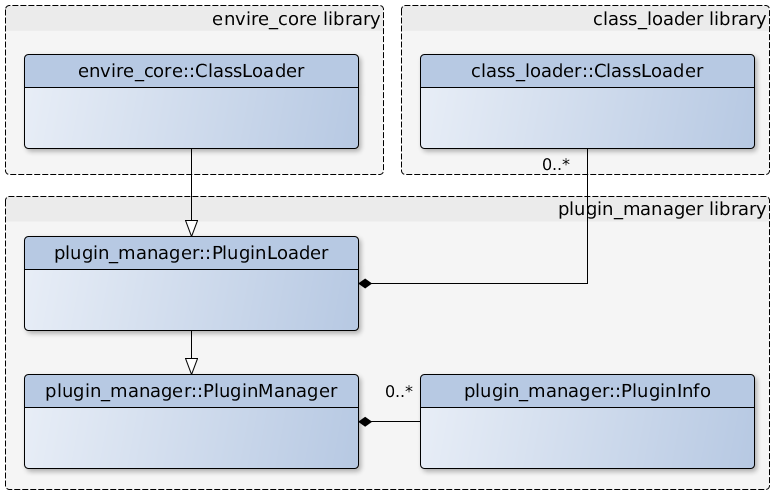EnviRe Plugins
Abstract
EnviRe is designed on a modular plug-in mechanism in order to facilitate maintainability and integrability of 3rd party libraries as PCL and OctoMap.
Overview
EnviRe provides tooling to easily define and load plug-in classes. As plugin-in back-end EnviRe relies on the class_loader library. To gather and provide meta informations about all available plug-ins the plugin_manager library is used.
For more details read the design section of this page.
Providing a user-data plug-in
In order to handle user data types in EnviRe they have to be embedded into a envire::core::Item<T> class.
The Item class augments the embedded type by a time-stamp, a reference frame and an unique ID.
To register a new plug-in of the type envire::core::Item<namespace::UserType> for it’s use with EnviRe, the macro
ENVIRE_REGISTER_ITEM ( namespace::UserType ) has to be placed in a source file (*.cpp).
It adds the class loader registration macro CLASS_LOADER_REGISTER_CLASS and also registers the
class to the serialization (See the serialization section for further details).
Note that the class UserType must be serializeable by boost serialization at that point.
In order to make the plug-in available to your system a XML file containing meta informations about the plug-in class needs to be exported.
Example
The following example shows how a new EnviRe item, with the embedded type
boost::shared_ptr<::octomap::AbstractOcTree>, is defined in a *.cpp file:
#include <octomap/AbstractOcTree.h>
#include <boost/shared_ptr.hpp>
#include <envire_core/plugin/Plugin.hpp>
ENVIRE_REGISTER_ITEM( boost::shared_ptr<octomap::AbstractOcTree> )
It is strongly recommended to use this macros when a new item is defined, since the plug-in mechanism and the serialization relay on it. Nonetheless it’s possible to define item classes without using this macro, in this case the class won’t be available as plug-in and it won’t be possible to serialize the class.
Since the embedded type must be serializeable by boost serialization, it might be necessary to implement the necessary methods in a header file.
To make the plug-in available to your system a XML file containing meta informations about the plug-in class needs to be exported. A minimal layout would look like this:
<library path="envire_octomap">
<class class_name="envire::core::Item<boost::shared_ptr<octomap::AbstractOcTree>>" base_class_name="envire::core::ItemBase">
</class>
</library>
This minimal layout can be extended by a class description, associations to other types and a singleton flag. If this optional fields are not defined, the description will be empty, there won’t be any associations and the plug-in won’t be a singleton instance.
<library path="envire_octomap">
<class class_name="envire::core::Item<boost::shared_ptr<octomap::AbstractOcTree>>" base_class_name="envire::core::ItemBase">
<description>Octomap OcTree plugin</description>
<associations>
<class class_name="boost::shared_ptr<octomap::AbstractOcTree>"></class>
<class class_name="octomap::AbstractOcTree"></class>
<class class_name="octomap::OcTree"></class>
</associations>
<singleton>false</singleton>
</class>
</library>
To install the XML file there is a cmake macro install_plugin_info available, which is
exported by the plugin_manager library.
rock_library(envire_octomap
SOURCES OcTree.cpp
HEADERS OcTree.hpp
DEPS_CMAKE Boost octomap
DEPS_PKGCONFIG class_loader envire_core)
install_plugin_info(envire_octomap)
The macro install_plugin_info installs a file named envire_octomap.xml to the folder
lib/plugin_manager relative to the currently defined CMAKE install path.
Using a plug-in
To create an instance of a plug-in the envire::core::ClassLoader singleton class can be used.
Since EnviRe plug-ins are pure class_loader plug-ins it’s also possible to load them by using
only the class_loader library or the PluginLoader class of the plugin_manager library.
For more details read the design section of this page.
Example
In the following example the OcTree plug-in class is loaded as abstract ItemBase class:
envire::core::ClassLoader* loader = envire::core::ClassLoader::getInstance();
if(loader->hasEnvireItem("envire::core::Item<boost::shared_ptr<octomap::AbstractOcTree>>"))
{
ItemBase::Ptr item;
if (loader->createEnvireItem("envire::core::Item<boost::shared_ptr<octomap::AbstractOcTree>>", item))
{
// A new item has been successfully created
}
}
The plug-in class can be also directly casted:
envire::core::Item<boost::shared_ptr<octomap::AbstractOcTree>>::Ptr item;
envire::core::ClassLoader::getInstance()->createEnvireItem< envire::core::Item<boost::shared_ptr<octomap::AbstractOcTree>> >("envire::core::Item<boost::shared_ptr<octomap::AbstractOcTree>>", item);
In this case at least the embedded type has to be known at compile time.
It is also possible to get an Item for a given embedded type by calling the method createEnvireItemFor("boost::shared_ptr<octomap::AbstractOcTree>", item).
Design

The EnviRe envire_core::ClassLoader relies on the plugin_manager library which relies on the
class_loader library.
The class_loader library handles the export of classes, loading of shared libraries
and the creation of new instances. More informations about the class_loader can be
found here.
The plugin_manager library handles XML files to provide a-priori meta informations
about the available plug-ins. In contrast to the ROS plugin_lib,
the plugin_manager supports singleton instances, associations and is framework
independent.
Advantages of the plugin_manager library:
- Gather meta informations of available plugins without loading them
- Model associations between classes
- Support of singleton instances
- Framework independent
The plugin_manager::PluginManager class parses all XML files and preprocesses the informations.
It can be queried about available plug-in classes, relations, associations or properties of classes.
An example of a XML file can be found in the previous section.
The plugin_manager::PluginLoader is a singleton class which on demand creates a new
class_loader::ClassLoader instance for each new library that is required. It also holds and
returns the same instance of a plug-in class if it is marked as singleton.
The envire_core::ClassLoader extends the PluginLoader by knowledge about the EnviRe
base classes.